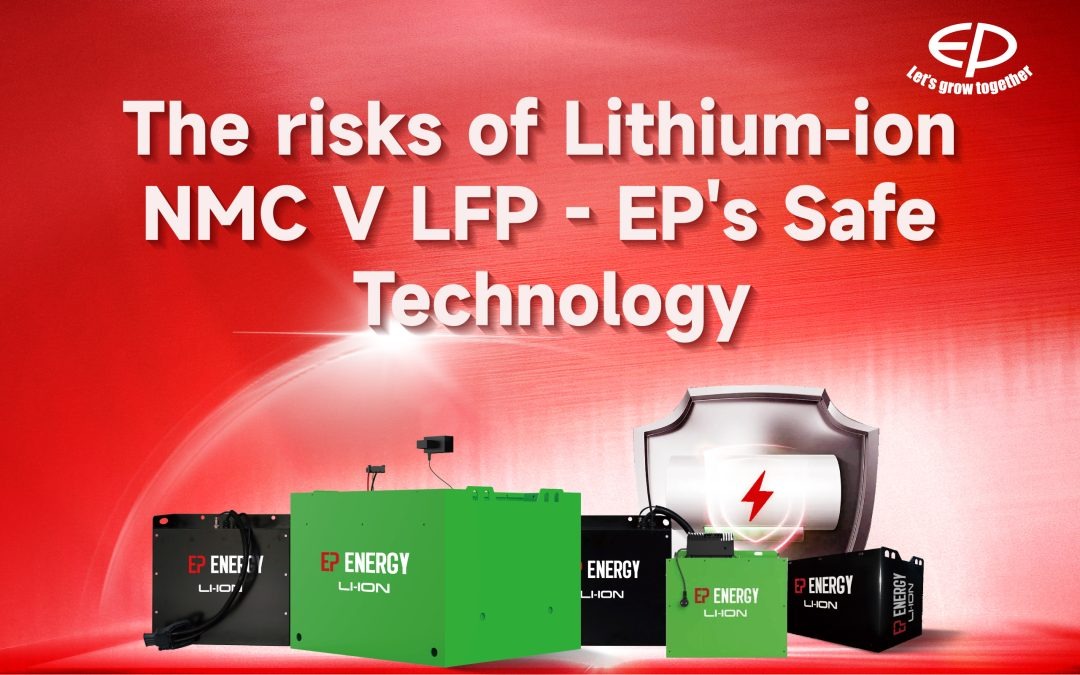In recent years, the world has witnessed an unprecedented surge in the demand for energy storage solutions, driven largely by the growing awareness of environmental concerns and the need for sustainable energy sources. Among the many technologies available, Lithium-ion batteries have emerged as the frontrunners, powering everything from smartphones to electric vehicles.
Within the realm of Lithium-ion batteries, two prominent types of lithium-ion stand out: NMC (Nickel Manganese Cobalt) and LFP (Lithium Iron Phosphate). Both have their unique advantages and applications, but they also come with their own set of risks. In this blog post, we will explore the risks associated with Lithium-ion NMC and LFP batteries, highlighting the commitment of EP Equipment in developing safe technology Lithium batteries.
What are Lithium-ion batteries?
Lithium-ion batteries (Li-ion batteries) are a type of rechargeable battery that uses lithium ions as the main component for its operation. They are widely used in portable electronics, electric vehicles, and many other applications due to their high energy density, lightweight design, and rechargeable nature.
EP Equipment’s Adoption of Li-ion in Material Handling
Lithium-ion batteries have been widely adopted in the production of electric vehicles. EP Equipment’s EPT 12EZ, introduced in 2016, has made Li-Ion batteries popular in the material handling market.
These batteries are particularly favoured for entry level pallet trucks. Since then, entry level pallet trucks are mainly produced with Li-Ion batteries. However, the technology used can differ quite significantly, leading to different characteristics and safety standards.
Its active materials give lithium-ion its name. There are several types of chemical components to build rechargeable lithium-ion batteries. The two most relevant materials to the forklift industry are Lithium Iron Phosphate (LFP) and Lithium Nickel Manganese Cobalt Oxide (NMC).
The Two Faces of Lithium-Ion: NMC and LFP
Understanding Lithium-ion NMC Batteries
Lithium-ion NMC batteries have gained widespread popularity thanks to their high energy density and relatively low production costs. Electric vehicles, laptops, and smartphones commonly use these batteries. The NMC chemistry, comprising nickel, manganese, and cobalt, offers a balance between energy density and power output. However, this balance comes at a cost.
Risks Associated with NMC Batteries
Thermal Runaway
One of the major risks associated with NMC batteries is thermal runaway. This phenomenon can happen when the battery overheats and can potentially catch fire or explode. This risk increases when you overcharge, puncture, or exposed the battery to high temperatures.
Limited Lifespan
NMC batteries tend to have a limited lifespan, especially when subjected to frequent charge and discharge cycles. Over time, the capacity of the battery degrades, reducing its overall efficiency and usability.
Environmental Impact
The mining and production of cobalt, a crucial component in NMC batteries, raise environmental and ethical concerns. Cobalt mining harms the environment.
Understanding Lithium Iron Phosphate (LFP) Batteries
LFP batteries, on the other hand, offer an alternative solution to these challenges. They are renowned for their stability, longevity, and enhanced safety features. LFP batteries use iron phosphate as the cathode material, which inherently possesses a higher thermal stability compared to cobalt-based chemistries.
Advantages of LFP Batteries
Enhanced Safety
LFP batteries have a superior thermal stability, making them resistant to thermal runaway even under extreme conditions. This inherent safety feature makes LFP batteries a preferred choice for applications where safety is paramount.
Longer Lifespan
LFP batteries exhibit a longer cycle life. This means that they can endure a higher number of charge and discharge cycles without significant degradation. This longevity not only reduces the frequency of replacements but also contributes to a more sustainable approach to energy storage.
Environmentally Friendly
LFP batteries do not contain toxic heavy metals like cobalt, making them more environmentally friendly. The production and disposal of LFP batteries have a lower environmental impact, aligning with the global efforts towards greener technologies.
EP Equipment’s Commitment to Safe Technology
In the pursuit of a safer and more reliable energy storage solution, EP Equipment adopts a safe technology. EP Equipment produces all its Li-Ion machines with LFP batteries to power its trucks. Li-phosphate is better at handling full charge and high voltage for long periods compared to other lithium-ion systems.
Quality and Safety in EP’s Li-Ion Solutions
EP uses top-quality cells, prioritizing safety. We aim to enhance energy and power density while prolonging service life.
Tailored Solutions for Diverse Applications
EP adopts LiFePO4 cells that work in different temperatures for various applications, even in extreme weather condition. EP has been designing and assembling custom battery solutions or various electronic applications. There are 13 specifications on lithium battery cells to match our customers’ unique requirements.

